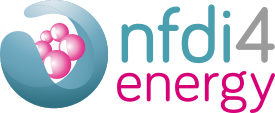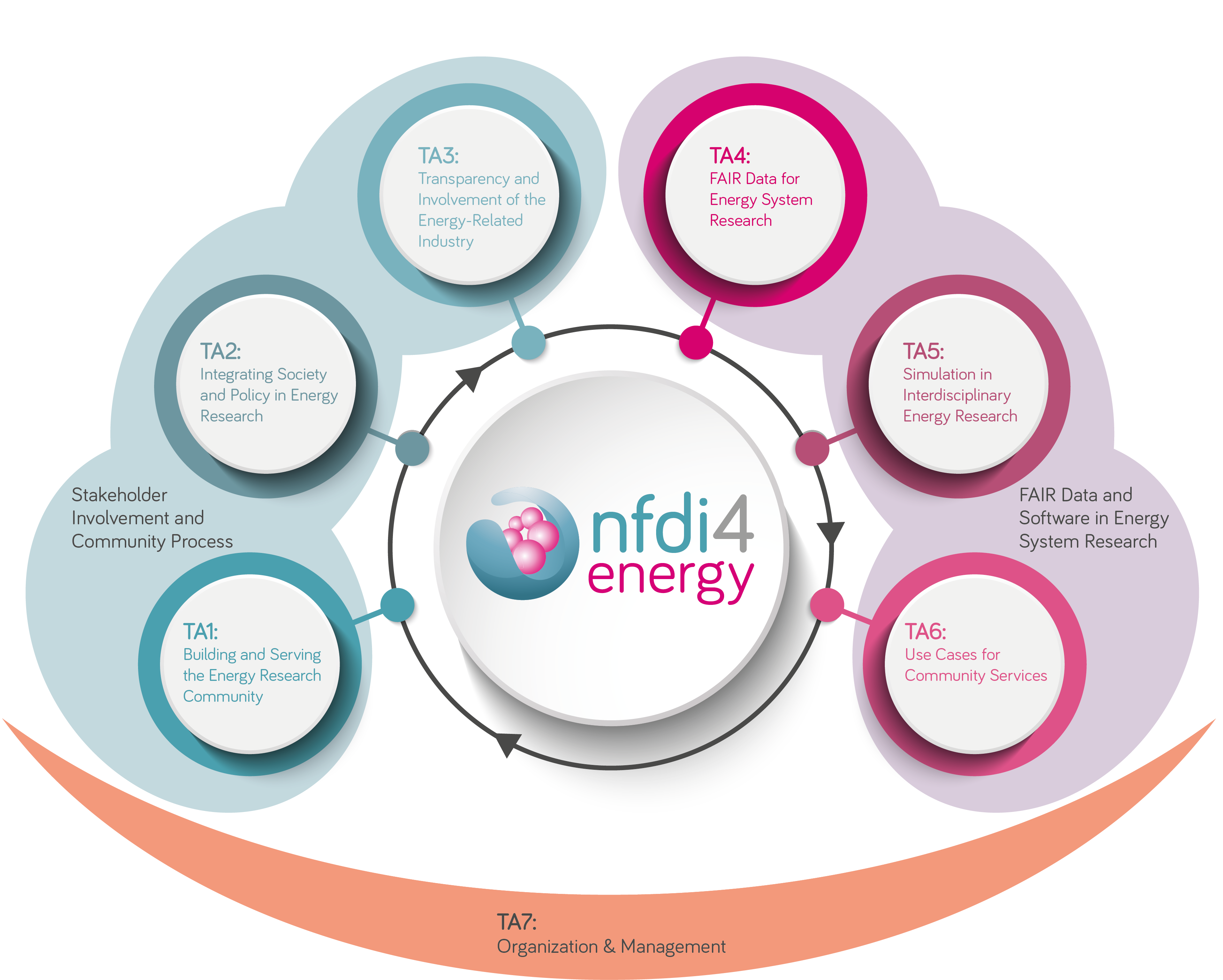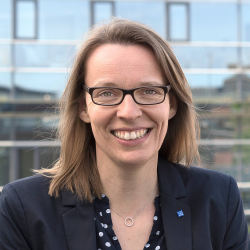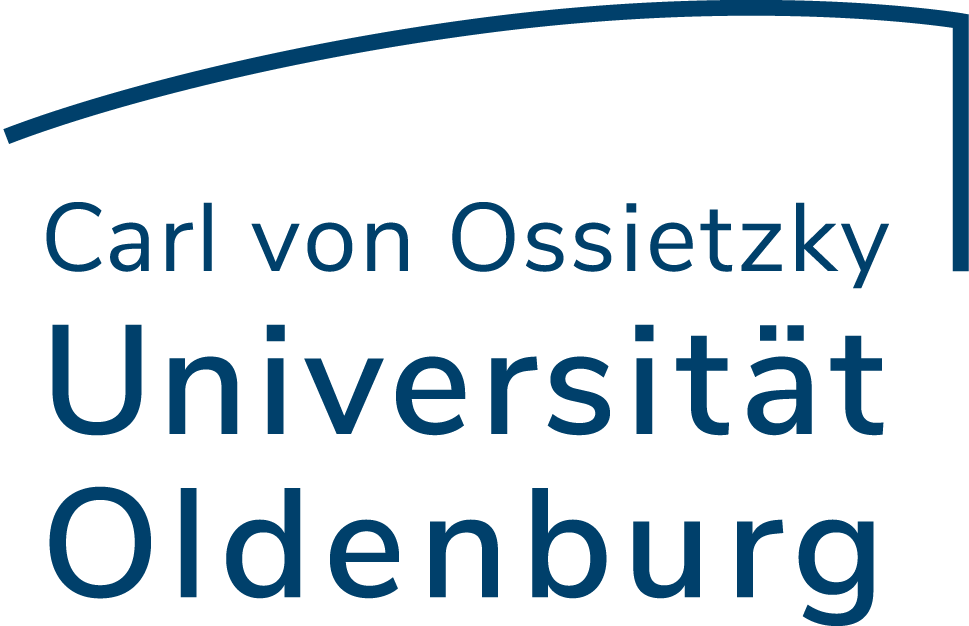
About us
The necessary transformation of energy systems towards net zero greenhouse gas emissions provides a plethora of new research challenges. In this context, the digitalisation towards cyber-physical energy systems (CPES) alleviates change, and equally affects technical, social, and societal topics, as well as the mode of research in the CPES research community.
Research efforts towards CPES heavily rely on modelling and (co-)simulation-based approaches. Tracking of models together with all data creates a complex software and data management challenge, which needs to be addressed in each research project.
In addition, energy system research is characterized by the fact that there is a strong connection to practice with industry partners on the one hand and a great need to involve society on the other hand. These additional stakeholders further increase the complexity of dealing with data and models in research.
To support researchers with these complex challenges, NFDI4Energy takes existing RDM approaches, among others, developed in other NFDI consortia, and adapts them to the needs of its own research community.
Goals
- Establish common research services for energy system research.
- Motivate the use of these common services in the energy system research community.
- Allow traceability, reproducibility, and transparency for research software and data in energy system research.
- Enable and motivate the involvement of society into energy system research.
- Promote better collaboration and knowledge transfer between scientific research institutes and business partners.
- Simplify identification, integration, and coordination of simulation-based models in research.
- Integrate the provided services within the wider NFDI ecosystem.
Task Area


Prof. Dr. Astrid Nieße
Speaker of the consortium
(Co-)applicant institutions and (co-)speakers:
- Prof. Dr. Anke Weidlich – Albert Ludwigs University Freiburg
- Prof. Dr. Reinhard German – Friedrich Alexander University Erlangen-Nürnberg
- Prof. Dr. Christof Weinhardt – Karlsruher Institute of Technology (KIT)
- Prof. Dr. Veit Hagenmeyer – Karlsruher Institute of Technology (KIT)
- Prof. Dr. Sebastian Lehnhoff – OFFIS e.V.
- Prof. Antonello Monti, Ph.D. – RWTH Aachen
- Prof. Dr. Berthold Vogel – Soziologisches Forschungsinstitut Göttingen (SOFI) e.V.
- Prof. Dr. Sören Auer – Leibniz Information Centre for Science and Technology University Library (TIB)
- Prof. Dr. Johan Lilliestam

Carl von Ossietzky University of Oldenburg
Applicant Institution
Participating Institutions
- Reiner Lemoine Institute (RLI)
-
Fraunhofer Institute of Applied Information Technology (FIT)
Use Cases
1. For energy system research laboratories are often used to simulate the real world. These laboratories are often coupled to software-based models for Hardware- and Software-in-the-Loop simulations. NFDI4Energy will support researchers in finding and orchestrating the right models based on semantic description of the models and laboratories. With its simulation service, NFDI4Energy will enable researchers to easily couple the different research artefacts to answer new research questions based on quality-assured input data.
2. Since the recent change in the German climate protection act that prescribes the goal of becoming carbon neutral until 2045, several larger energy system scenario studies have published their extensive results, and even more scenario results are expected to be published in the coming months and years. As each study takes a different approach, it is difficult to compare results quantitatively, and to draw overall conclusions about consensus and controversies in the findings. The services of NFDI4Energy should enable an easy comparison of the output data and outcomes of different scenarios. Key aspects can be visualized for making it intuitively accessible to policy makers and other interested stakeholders. In view of the need to quickly transform our energy systems, this easily accessible and understandable information is of high practical need.
3. Due to the increasing integration of renewable energies, the interaction and coordination between all actors in the energy system is needed to efficiently manage the high volatility of generation and grid congestions at all grid levels. Market mechanisms for the use of flexibilities require closer cooperation between both grid operators and private actors delivering flexibility options on lower voltage levels. Self-organisation using autonomous systems represented by software agents are the foundation for adaptive and self-healing systems, especially in future application areas, like redispatch based on market principles. Research in this field relies on simulation, multiple data sources and a good interaction with society. With NFDI4Energy, researchers can use modern simulation services to couple existing models as well as use existing data for their research. NFDI4Energy will additionally show best practices to integrate society into research.

Prof. Dr. Astrid Nieße
Speaker of the consortium

Carl von Ossietzky University of Oldenburg
Applicant Institution
(Co-)applicant institutions and (co-)speakers:
- Prof. Dr. Anke Weidlich – Albert Ludwigs University Freiburg
- Prof. Dr. Reinhard German – Friedrich Alexander University Erlangen-Nürnberg
- Prof. Dr. Christof Weinhardt – Karlsruher Institute of Technology (KIT)
- Prof. Dr. Veit Hagenmeyer – Karlsruher Institute of Technology (KIT)
- Prof. Dr. Sebastian Lehnhoff – OFFIS e.V.
- Prof. Antonello Monti, Ph.D. – RWTH Aachen
- Prof. Dr. Berthold Vogel – Soziologisches Forschungsinstitut Göttingen (SOFI) e.V.
- Prof. Dr. Sören Auer – Leibniz Information Centre for Science and Technology University Library (TIB)
- Prof. Dr. Johan Lilliestam
Participating Institutions
- Reiner Lemoine Institute (RLI)
-
Fraunhofer Institute of Applied Information Technology (FIT)